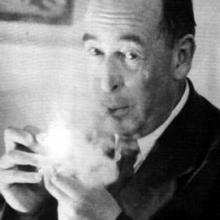Mere Christianity
I was recently talking with friends about looking people up online. I told the story of being unpleasantly surprised to find, on someone’s Facebook profile, that he was affiliated with a sports-themed summer camp in the Middle East run by Christians with the not-as-subtle-as-they-think motivation of converting (or at least … influencing) young Muslim campers. As I told the story, I could see that I had probably picked the wrong audience: friends who, while they might not have signed up for such a project themselves, certainly knew people who would. I trailed off lamely, debating with myself whether to bother noting the obvious as an excuse for my reaction: that they had grown up in conservative churches and I in a liberal one.
But thinking about it later, I realized it was more than that. “I don’t believe in converting people,” I wanted to go back and say to them. “Not in the way that I don’t believe in wearing white after Labor Day — like a personal preference or moral objection — but in the way that I don’t believe in Santa Claus.” I do not believe it happens.
To be more specific, I don’t believe in people converting people. Conversion, obviously, happens. And other people may be there, even standing by and handing the convert a pamphlet. The convert may even be saying, “Because of you, I am converting!” But I don’t buy it.
When he died on Nov. 22, 1963 hardly a soul blinked in Northern Ireland where he was born or in England where he spent most of his working life as one of the world’s greatest Christian apologists.
Clive Staples Lewis was a week short of 65 when he suffered a heart attack at his home in Oxford. The obituary writers barely noticed his demise, in part because he died on the same day that President John F. Kennedy was assassinated in Dallas.
British indifference to Lewis half a century ago will be examined at a one-day seminar at Wheaton College on Nov. 1, co-sponsored by the Marion E. Wade Center, the Institute for the Study of American Evangelicals and Wheaton College’s Faith and Learning program.
Lewis may be the most popular Christian writer in history, with millions of copies of his books sold, the vast majority in the United States where his influence is far greater than in his native country.
Was it Lewis’ modesty or British fear of discussing religion that fueled such indifference in Britain and Ireland?
Famous author C.S. Lewis was recognized for his fictional representation of God/Jesus in the celebrated novel, Chronicles of Narnia. As his theological explanation of Christianity continues to play out, nearly 50 years after his death, Lewis’ legacy of “Narnia” remains resourceful for people in a time of need. The New York Times reports:
But the text for which Lewis is best known is his “Chronicles of Narnia.” And what “Narnia” offers is not theological simplicity, but complexity. The God represented in these books is not quite real (it’s fiction) and yet more real than the books pretend (that’s not a lion, it’s God). That complexity may help people to hang on to faith in a secular society, when they need a God who is in some ways insulated from human doubt about religion.
Read more here.

